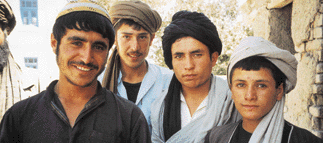American Indian Scouts helped regular US Army units pursue and attack rival Indian tribes in the 1800s. Their expertise of local terrain, languages, and tribal habits proved essential for success. Most Army officers even followed their tactical advice. A notable exception was the dashing Army officer, George Armstrong Custer, who disregarded the pleas of his Arikaras and Crow scouts to turn back, leading to the "Slaughter" at Little Big Horn. Local scouts were also used the Philippine campaign and during the Vietnam war.
 As the US Army plans to send conventional forces into Afghanistan, the
recruiting and training of "Afghan Scouts" should be a top
priority. Americans are completely unfamiliar with the local languages,
terrain, or culture. Since operations will quickly become
counter-insurgency, this problem is magnified as enemy combatants blend in with
the local population. Fortunately, there are over a million Afghan
refugees in Pakistan who have already proved their dissatisfaction with the
Taliban regime by fleeing.
As the US Army plans to send conventional forces into Afghanistan, the
recruiting and training of "Afghan Scouts" should be a top
priority. Americans are completely unfamiliar with the local languages,
terrain, or culture. Since operations will quickly become
counter-insurgency, this problem is magnified as enemy combatants blend in with
the local population. Fortunately, there are over a million Afghan
refugees in Pakistan who have already proved their dissatisfaction with the
Taliban regime by fleeing.
A top priority over the Winter should be to
train 1000 Afghan scouts to advise and assist US forces. English language
training is the key focus, but they must also learn military terminology, the
use of basic American infantry weapons, and become physically fit. They
must also be taught about the 9-11 attacks, and why the USA is determined to
remove terrorists from their country. This will allow Afghan Scouts to
also serve as ambassadors to local villages and gradually inform all Afghans why
Americans are there. The Scouts would be paid well, and perhaps they could
collect a bonus for each terrorist they help locate. These native Afghans
could instantly detect an Arab accent, and are already mine experts after
growing up in Afghanistan. The Scouts would be enlisted for a four-year
term, or until they are no longer needed. At that point, they will receive
a large bonus, which is important to discourage Scouts from deserting or selling
out their American buddies. 
Ideally, the US military could form a new Afghan army to conquer the Taliban. However, building an Army takes years since you can't train senior NCOs and officers in a few months. Nevertheless, an effort should be made to form a Pashtun brigade to capture and control Kabul. Meanwhile, if US ground troops plan to fight in Afghanistan soon, the training of Afghan scouts is urgent. The US military has many brilliant officers, and certainly some have pushed this idea, and maybe it is underway. However, the big military bureaucracy usually focuses on current demands and often fails at long-term planning. The training of Afghan Scouts should have already begun so that when regular US ground forces arrive, each combat platoon is escorted by a couple loyal expert scouts. Finding Osama bin Laden in Afghanistan has been compared to looking for a needle in a haystack. Without Afghan scouts, it will be like looking for that needle while blindfolded.
Carlton Meyer editorG2mil@Gmail.com
©2001 www.G2mil.com
Historical Note: American troops will have to go look for the Taliban in the remote boondocks, or boonies. This is a Philipino-Tagalog word that US soldiers adopted during the counter-insurgency campaign in the Philippines which became part of American English.